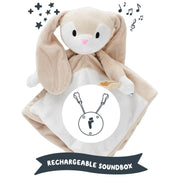
Why Sleep is Vital for Babies
Sleep is one of the most crucial factors in your baby's growth and you’ll come to see why shortly.
Although it may appear that all they do is lay there rested, those priceless hours of shuteye are essential for their development and general well-being. Their minds actively process information, create new links, and consolidate memories while they sleep. It's like a little mental exercise!
Also, a good night's sleep can make all the difference in a baby's temperament during their waking hours, making them happier, more alert, and ready to explore their world.
Why Sleep is Important for Your Baby
One of the silent and maybe even vocal pleas of new mums is for their babies to sleep so they too can get some rest. But helping your newborn to sleep is far more important than getting a few good hours of uninterrupted sleep, it’s one of the building blocks of their development.
Infants develop incredibly quickly in the first year of their lives. They most likely will have doubled their birth weight by the time they turn one year old. Your child will learn several skills during this time, such as turning over, sitting up, crawling, standing, consuming solid food, building social skills, and perhaps even walking and using their first words. For them to grow physically and cognitively, they need their beauty sleep.
In the first year of life, your baby's brain approximately doubles in size. They grow quickly, and a large portion of their learning occurs while they are asleep. Sleep-related brain activity directly impacts a child's capacity for learning and may even have an impact on growth and mood problems.
In simpler words, your baby's brain develops during slumber. Slow-wave sleep, also known as deep sleep, is crucial for memory consolidation, which may be crucial for early language learning.
Just How Much Sleep Does Your Young Bub Need?
Depending on their maturity, your baby's sleep requirements change. The basic recommendations for how much sleep your infant requires are as follows:
- Newborn (0–3 months): Infants require between 14 and 17 hours of sleep per day, including naps and overnight sleep. They frequently have sporadic sleep because they usually need to feed every two to three hours.
- Babies (4 to 11 months): At this stage, babies require 12 to 15 hours of sleep every day, including naps and overnight sleep. Even though they may begin to sleep for extended periods at night, they still need to get up at least once during the night to eat.
It's essential to remember that every baby is distinct and may have peculiar sleeping requirements. Also, some infants may need more or less sleep than what the general recommendations indicate.
Always consult a pediatrician if you have concerns about your baby's sleep requirements or are worried about their sleeping habits.
The 2 Main Phases of a Baby’s Sleep
For babies, sleep is divided into two phases, which are explained below:
1. Rapid Eye Movement (REM)
This is also called the active stage. In this stage, the infant's eyes begin to shift behind the closed eyelashes, and the limbs or legs begin to twitch or jerk. Breathing is frequently erratic, and it may halt for 5 to 10 seconds (this is known as typical periodic breathing of infancy) before starting again with a surge of fast breathing for 10 to 15 seconds at a rate of 50 to 60 breaths per minute, accompanied by normal breathing till the cycle repeats itself.
There are important links between the brain's neurons and the brain that builds the foundation for everything it learns, removing inactive connections in the process. Dreaming happens during active sleep.
2. REM-free Deep Sleep
This is also referred to as quiet sleep. The baby stops twitching and making other motions, and gradually drifts off to slumber. It might be more challenging to wake the baby up during this time. Blood flow to the muscles is boosted, energy is replenished, and tissue development and repair occur.
Major Factors That Affect Sleep in Your Baby
There are several factors that can affect the quality and duration of sleep in babies. While many of them can be combated by making the baby more comfortable, a few of them are part of your baby’s developmental stages, and they will adjust as they grow older.
- Age is one of the most common factors. Newborns typically sleep for up to 17 hours daily while older babies get about 14 hours of sleep per day. So, the older your baby grows, the less sleep you may expect.
- A soiled diaper can make your baby uncomfortable and interrupt their sleep routine. Similar to this is their sleep environment. Too hot or too cold sleeping areas may cause discomfort in your baby. A dim-lit, cool area is optimal for the best sleep.
- Hunger or illness are other common factors that affect your baby’s sleep. Is your baby teething or doing the “hungry” cry? Do they have the flu? Or an ear infection? These can poorly impact their sleep.
- Are there certain activities you usually do to help your baby sleep and then stop all of a sudden? Many mums have discovered that stopping nursing or rocking the baby to sleep cold turkey without easing their babies out of the sleep-time activities can affect their baby’s sleep.
- Some babies may be predisposed to sleep problems due to genetic factors.
6 Steps To Help Your Baby Grow Into a Good Sleep Pattern
If you’re worried about your young one not enjoying a good night’s sleep, then there are some steps you can take to ensure they do.
1. Begin by creating an easy-to-follow nighttime routine that gives your baby a sleep cue. It may be to read a bedtime story, give them a bath, or sing lullabies.
2. Next, prepare the perfect sleep environment by setting up a dimly lit space and a cool atmosphere that triggers sleep signals.
3. Avoid activities that make them overly excited during bedtime such as watching TV or playing with toys.
4. Make a plan to help your baby control their hunger signals. This may require creating a breastfeeding routine that you can follow.
5. During the day, pay attention to your baby’s needs. Keep them comfortable and encourage them to take naps that help them adjust to nighttime sleep time, it may result in restful sleep at night.
6. Take your time, knowing that it requires patience to create a functional sleep schedule. It’s not a one-day job. Consistency and repeated effort are what you need to make this work.
Tips to Help Your Baby Sleep Better
There are several ways you can support your baby's sleep to ensure they get the rest they need for healthy development. You can try out these naptime tips to get sleep-filled results.
- Know your baby’s body signals: It doesn’t take much for babies to fall into a tired fit, which makes it even more difficult for them to get some shuteye. However, there are tell-tale signals when your baby is struggling with this—for instance, yawning or rubbing their eyes. Start off their routine before this occurs for better results.
- Soothe them with a pacifier or sleep toy: Pacifiers are well-known to help babies self-soothe; they’re also popular for helping them doze off to dreamland. Make ample use of them but take them out of their mouth once they start snoozing.
Any of the white noise sleep toys from RiffRaff’s Collection also works wonders in soothing your baby and helping them fall into deep sleep faster.
- Try the swaddling method: Babies love the familiarness of being wrapped in a snugly warm blanket because it reminds them of the cozy warm environment they were used to for 9 months.
The swaddle method recreates the sensations they felt in the womb, helping to boost their quality of sleep and even the sleep duration because they feel calm and relaxed.
FAQs About Sleep Patterns for Babies
Have any more questions about your baby’s sleep patterns? We’ve answered some below.
When do I start to worry if my newborn doesn’t settle into a sleep pattern?
In the first few weeks of life, it's typical for babies to not have a regular sleeping schedule. Newborns typically sleep for about 16-17 hours a day, but these hours are not typically consolidated into long stretches of sleep. Instead, they tend to sleep in short periods of 2-4 hours at a time, waking up to feed and then falling back to sleep.
By the time they are 3 to 4 months old, most babies will begin to establish more normal sleep patterns. However, if your infant is still not exhibiting any indications of establishing a consistent sleep routine at this point, it may be worth discussing with your pediatrician.
Some signs that your newborn may be having difficulty sleeping could include:
- Having trouble falling asleep or staying asleep for long periods of time
- Being overly fussy or irritable when awake
- Not seeming to be getting enough sleep overall
- Being difficult to soothe or calm down
Is there anything to note about my baby’s sleep as they grow up?
Yes, there are several things to look forward to and prepare for as your newborn begins to age.
- As your baby grows up, the amount of sleep it will need will start to change. Newborns get an average of 17 hours per day, but between 3 to 11 months, this drops to about 15 hours max daily. Toddlers aged 1 to 2 years need about 14 hours of sleep per day, and preschoolers between 3 to 5 years need around 13 hours of sleep daily.
- At certain intervals, your baby who previously used to have uninterrupted sleep may start to wake up frequently at night. It’s also known as sleep reversion. You may expect these changes at different intervals during their growth, ranging between 4, 8, and 18 months.
Why does my baby's sleep pattern change so often?
Change is the one constant thing you’ll experience as your baby gets older, and these changes do not exclude your baby’s sleep pattern. Growth and development is the main reason for this change. As babies, they deal with several growth spurts that trigger a disruption in their sleep patterns. From the need for extra food to teething, and more, waking up frequently at night is inevitable.
How long does it take to change my baby’s sleep habits?
There’s no one-size-fits-all answer for every baby, as each baby has its own specific needs. Changing your baby’s sleeping habits can last between a couple of days to several weeks, depending on many different factors, like we discussed earlier.
Your approach to changing your baby’s pattern may also influence how quickly they adjust. The key to successfully maneuvering this delicate time is being patient and gentle with your baby.
Always follow safe sleep guidelines and use under adult supervision with infants under 7 months.















































